| Listing 1 - 10 of 18 | << page >> |
Sort by
|
Book
ISBN: 2753594155 2753587965 Year: 2023 Publisher: Rennes : Presses universitaires de Rennes,
Abstract | Keywords | Export | Availability | Bookmark
 Loading...
Loading...Choose an application
- Reference Manager
- EndNote
- RefWorks (Direct export to RefWorks)
Cet ouvrage présente au public francophone la figure de Samuel Wilberforce, et porte à sa connaissance la vitalité de l’anglicanisme victorien dont il fut une figure si importante comme évêque d’Oxford puis de Winchester (1845-1873). Au début du xixe siècle, l’Église d’Angleterre (ou Église anglicane) court le risque de devenir tout à fait obsolète. Rejetée par beaucoup comme un simple organe étatique, apparemment privée de toute énergie et de toute capacité à se réinventer par les mouvements de réveil religieux du siècle précédent, elle paraît également incapable de s’adapter au nouveau contexte philosophique et socio-économique de la révolution industrielle. Toutefois, à partir des années 1840, l’Église d’Angleterre réinvestit son rôle pastoral et spirituel afin de rester fidèle à sa fonction proverbiale et traditionnelle d’Église de la Nation. On le verra, ce n’est pas un hasard si l’épiscopat de Samuel Wilberforce coïncide avec cette évolution spectaculaire de son Église. Même 150 ans après sa mort, la vie et l’œuvre de Samuel Wilberforce ont beaucoup à nous apprendre concernant la place des Églises dans la Cité, ou la relation entre foi et science.
Religion --- History --- Église anglicane --- anglicanisme --- histoire religieuse --- XIXe siècle
Book
ISBN: 2377472885 237747053X Year: 2021 Publisher: Grenoble UGA Éditions
Abstract | Keywords | Export | Availability | Bookmark
 Loading...
Loading...Choose an application
- Reference Manager
- EndNote
- RefWorks (Direct export to RefWorks)
Cet ouvrage est une traduction française de trente-deux poèmes majeurs extraits du Temple de George Herbert, poète anglais essentiel du xviie siècle. La mise en regard des textes français et anglais permet de s’étendre sur la poésie proprement dite, ses effets et ses subtilités. Écrite dans un style concis, émaillée de formules frappantes et éclairantes, l’introduction relève le défi consistant à donner à comprendre en quelques pages la signification, la nature et la portée de la poésie de Herbert. Le poète est en effet bien plus qu’un témoin des soubresauts religieux de son temps : il est celui dont « le coeur pérégrinant » exprime l’errance et l’obstination spirituelles de l’homme.
Religion --- Literature --- Literature, British Isles --- Poetry --- métaphysique --- John Donne --- spiritualité --- errance --- religion --- anglicanisme --- parabole --- rédemption
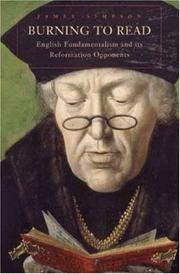
ISBN: 9780674026711 0674026713 0674043677 9780674043671 9780674046122 0674046129 0674267370 9780674267374 Year: 2007 Publisher: Cambridge, Mass. Harvard University Press
Abstract | Keywords | Export | Availability | Bookmark
 Loading...
Loading...Choose an application
- Reference Manager
- EndNote
- RefWorks (Direct export to RefWorks)
Amid present-day conflagrations, this illuminating book reminds us of the sources, and profound consequences, of Christian fundamentalism in the sixteenth century. Simpson focuses on the cultural transformation in early modern England that allowed common people to read the Bible for the first time. The last wave of fundamentalist reading in the West provoked 150 years of violent upheaval; as we approach a second wave, this powerful book alerts us to our peril.
History of the United Kingdom and Ireland --- Christian church history --- anno 1500-1599 --- Reading. --- Lecture --- Great Britain --- Grande-Bretagne --- Church history --- Histoire religieuse --- 283*1 --- Reading --- Language arts --- Elocution --- Anglicanisme:--16de eeuw --- Study and teaching --- 283*1 Anglicanisme:--16de eeuw
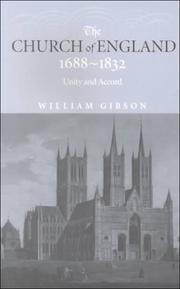
ISBN: 9786610328390 1134552068 1280328398 9780203169875 0203134621 0203169875 9780203169872 9780203134627 9780415240222 0415240220 9780415240239 0415240239 0203180100 9780203180105 0415240220 0415240239 9781134552016 9781134552054 9781134552061 113455205X Year: 2001 Publisher: London New York Routledge
Abstract | Keywords | Export | Availability | Bookmark
 Loading...
Loading...Choose an application
- Reference Manager
- EndNote
- RefWorks (Direct export to RefWorks)
Both a detailed, wide ranging history of the church in the eighteenth century and a fresh and stimulating re-evaluation of the nature of Anglicanism and its role in society.
Church of England --- Anglican Church --- Anglikanskai︠a︡ t︠s︡erkovʹ --- Ecclesia Anglicana --- Kirche von England --- United Church of England and Ireland --- History. --- England --- Church history. --- 283*2 --- 283*2 Anglicanisme:--18de eeuw --- Anglicanisme:--18de eeuw
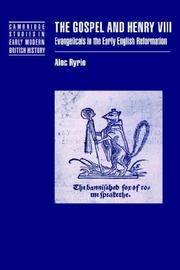
ISBN: 0521823439 9780521823432 9780511496028 9780521036658 0521036658 1107136954 051112130X 0511062109 0511326440 0511496028 1280162619 0511204957 051107056X 9780511062100 9780511121302 6610162611 9786610162611 9780511070563 9780511204951 9781107136953 9781280162619 9780511326448 Year: 2003 Volume: *20 Publisher: Cambridge Cambridge University Press
Abstract | Keywords | Export | Availability | Bookmark
 Loading...
Loading...Choose an application
- Reference Manager
- EndNote
- RefWorks (Direct export to RefWorks)
During the last decade of Henry VIII's life, his Protestant subjects struggled to reconcile two loyalties: to their Gospel and to their king. This book tells the story of that struggle and describes how a radicalised English Protestantism emerged from it. Focusing on the critical but neglected period 1539-47, Dr Ryrie argues that these years were not the 'conservative reaction' of conventional historiography, but a time of political fluidity and ambiguity. Most evangelicals continued to hope that the king would favour their cause, and remained doctrinally moderate and politically conformist. The author examines this moderate reformism in a range of settings - in the book trade, in the universities, at court and in underground congregations. He also describes its gradual eclipse, as shifting royal policy and the dynamics of the evangelical movement itself pushed reformers towards the more radical, confrontational Protestantism which was to shape the English identity for centuries.
Christian church history --- Henry VIII [King of England] --- Reformation --- -Protestantism --- -283*1 --- 283*1 Anglicanisme:--16de eeuw --- Anglicanisme:--16de eeuw --- Christianity --- Church history --- Protestant churches --- Protestant Reformation --- Counter-Reformation --- Protestantism --- History --- -Anglicanisme:--16de eeuw --- Henry --- Henricus --- Heinrich --- Enrique --- Henri --- Hendrik --- Enrico --- Relations with Protestants. --- Great Britain --- -Reformation --- 283*1 --- English Reformation --- England --- 16th century --- Henry VIII --- Henry VIII, 1509-1547 --- Arts and Humanities --- Relations --- Protestant churches.
Book
ISBN: 9780521770385 9780511575846 9780521369947 0521770386 9780511508301 0511508301 051157584X 1107194679 051150764X 1282058428 9786612058424 051150456X 0511508964 0511506708 0521369940 9781107194670 9781282058422 6612058420 9780511508967 9780511506703 Year: 2009 Volume: *80 Publisher: Cambridge New York Cambridge University Press
Abstract | Keywords | Export | Availability | Bookmark
 Loading...
Loading...Choose an application
- Reference Manager
- EndNote
- RefWorks (Direct export to RefWorks)
This book explores the enforcement of the English Reformation in the heartland of English Ireland during the sixteenth century. Focusing on the diocese of Dublin - the central ecclesiastical unit of the Pale - James Murray explains why the various initiatives undertaken by the reforming archbishops of Dublin, and several of the Tudor viceroys, to secure the allegiance of the indigenous community to the established Church ultimately failed. Led by its clergy, the Pale's loyal colonial community ultimately rejected the Reformation and Protestantism because it perceived them to be irreconcilable with its own traditional English culture and medieval Catholic identity. Dr Murray identifies the Marian period, and the opening decade of Elizabeth I's reign, as the crucial times during which this attachment to survivalist Catholicism solidified, and became a sufficiently powerful ideological force to stand against the theological and liturgical innovations advanced by the Protestant reformers.
Reformation --- -Reformation --- -27 <415> --- 283*1 --- Protestant Reformation --- Church history --- Counter-Reformation --- Protestantism --- Kerkgeschiedenis--Ierland--(als geheel) --- Anglicanisme:--16de eeuw --- History --- Church of Ireland. --- Dublin (Diocese, Anglican) --- Dublin (Ireland : Diocese : Church of Ireland) --- -Ireland --- Irish Free State --- Ireland --- 283*1 Anglicanisme:--16de eeuw --- 27 <415> --- English Reformation --- Arts and Humanities
Book
ISBN: 9781107018020 9781139086295 1139086294 1107018021 9781139776561 1139776568 1139888714 1139793950 1139779605 1139782592 1139783564 1283714663 1139778080 1316635570 Year: 2012 Publisher: Cambridge Cambridge University Press
Abstract | Keywords | Export | Availability | Bookmark
 Loading...
Loading...Choose an application
- Reference Manager
- EndNote
- RefWorks (Direct export to RefWorks)
The practice of swearing oaths was at the centre of the English Reformation. On the one hand, oaths were the medium through which the Henrician regime implemented its ideology and secured loyalty among the people. On the other, they were the tool by which the English people embraced, resisted and manipulated royal policy. Jonathan Michael Gray argues that since the Reformation was negotiated through oaths, their precise significance and function are central to understanding it fully. Oaths and the English Reformation sheds new light on the motivation of Henry VIII, the enforcement of and resistance to reform and the extent of popular participation and negotiation in the political process. Placing oaths at the heart of the narrative, this book argues that the English Reformation was determined as much by its method of implementation and response as it was by the theology or political theory it transmitted.
Oaths --- Reformation --- 27 <41> "16" --- 283*1 --- English Reformation --- Manners and customs --- Vows --- 283*1 Anglicanisme:--16de eeuw --- Anglicanisme:--16de eeuw --- Kerkgeschiedenis--Verenigd Koninkrijk van Groot-Brittannië en Noord-Ierland--"16" --- Law and legislation --- England --- Church history --- Oaths. --- Arts and Humanities --- History
Book
ISBN: 1282053434 9786612053436 0191565342 9780191565342 9780199557868 0199557861 9781282053434 Year: 2009 Publisher: Oxford New York Oxford Univ. Press
Abstract | Keywords | Export | Availability | Bookmark
 Loading...
Loading...Choose an application
- Reference Manager
- EndNote
- RefWorks (Direct export to RefWorks)
Jean-Louis Quantin shows how the appeal to Christian antiquity played a key role in the construction of a new confessional identity, 'Anglicanism', maintaining that theologians of the Church of England came to consider that their Church occupied a unique position, because it alone was faithful to the beliefs and practices of the Church Fathers. - ;Today, the statement that Anglicans are fond of the Fathers and keen on patristic studies looks like a platitude. Like many platitudes, it is much less obvious than one might think. Indeed, it has a long and complex history. Jean-Louis Quantin shows
Fathers of the church. --- Church fathers --- Patristics --- Philosophy, Patristic --- Christians --- Church of England --- United Church of England and Ireland --- Anglican Church --- Anglikanskai︠a︡ t︠s︡erkovʹ --- Ecclesia Anglicana --- Kirche von England --- Doctrines --- History --- Fathers of the church --- 283*15 --- 283*15 Anglicanisme:--17de eeuw --- Anglicanisme:--17de eeuw
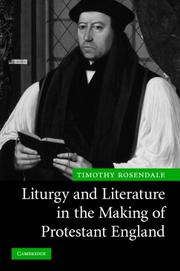
ISBN: 9780511483929 9780521877749 9780521173988 9780511355950 0511355955 0511354932 9780511354939 0511483929 0521877741 1281153745 9781281153746 0521173981 1107183170 9781107183179 9786611153748 6611153748 1139133144 9781139133142 0511355459 9780511355455 0511354355 9780511354359 Year: 2007 Publisher: Cambridge, UK New York Cambridge University Press
Abstract | Keywords | Export | Availability | Bookmark
 Loading...
Loading...Choose an application
- Reference Manager
- EndNote
- RefWorks (Direct export to RefWorks)
The Book of Common Prayer is one of the most important and influential books in English history, but it has received relatively little attention from literary scholars. This study seeks to remedy this by attending to the prayerbook's importance in England's political, intellectual, religious, and literary history. The first half of the book presents extensive analyses of the Book of Common Prayer's involvement in early modern discourses of nationalism and individualism, and argues that the liturgy sought to engage and textually reconcile these potentially competing cultural impulses. In its second half, Liturgy and Literature traces these tensions in subsequent works by four major authors - Sidney, Shakespeare, Milton, and Hobbes - and contends that they operate within the dialectical parameters laid out in the prayerbook decades earlier. Rosendale's analyses are supplemented by a brief history of the Book of Common Prayer, and by an appendix which discusses its contents.
Liturgy and literature --- 264.03 --- 283*1 --- Literature and liturgy --- Literature --- 283*1 Anglicanisme:--16de eeuw --- Anglicanisme:--16de eeuw --- 264.03 Anglicaanse liturgie. Episcopaalse Liturgie. Book of Common Prayer --- Anglicaanse liturgie. Episcopaalse Liturgie. Book of Common Prayer --- Church of England. --- United Church of England and Ireland. --- England --- Church history. --- Liturgy and literature. --- Arts and Humanities
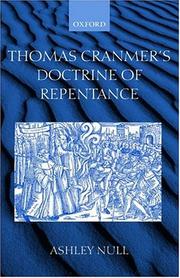
ISBN: 0198270216 0191683957 1429470542 0191514152 128075348X 0199210004 0191520756 9780191520754 9780191514159 9781280753480 9781429470544 9786610753482 6610753482 9780199210008 9780198270218 Year: 2006 Publisher: Oxford Oxford University Press
Abstract | Keywords | Export | Availability | Bookmark
 Loading...
Loading...Choose an application
- Reference Manager
- EndNote
- RefWorks (Direct export to RefWorks)
Puppet, Protestant partisan, or Erasmian humanist: which, if any, was Thomas Cranmer? Historians have offered radically contradictory assessments of this key participant in the changes to English life brought about by the Reformation. This book examines little-used manuscript sources to reconstruct Cranmer's personal and theological development. - ;Self-serving lackey, self-deceiving puppet, Swiss Protestant partisan, or sensible Erasmian humanist: which, if any, was Thomas Cranmer? For centuries historians have offered often bitterly contradictory answers. Although Cranmer was a key participation
2 CRANMER, THOMAS --- 283*1 --- 234.121 --- Repentance --- -234.121 Rechtvaardiging. Dispositie voor de rechtvaardiging. Geloof alleen volstaat niet --- Rechtvaardiging. Dispositie voor de rechtvaardiging. Geloof alleen volstaat niet --- 283*1 Anglicanisme:--16de eeuw --- Anglicanisme:--16de eeuw --- Attrition --- Contrition --- Penitence --- Sin --- Penance --- 2 CRANMER, THOMAS Godsdienst. Theologie--CRANMER, THOMAS --- Godsdienst. Theologie--CRANMER, THOMAS --- Christianity --- -History of doctrines --- -Cranmer, Thomas --- -Contributions in doctrine of repentance --- History of doctrines --- Cranmer, Thomas, --- -Sin --- 234.121 Rechtvaardiging. Dispositie voor de rechtvaardiging. Geloof alleen volstaat niet --- -Attrition --- -Christianity
| Listing 1 - 10 of 18 | << page >> |
Sort by
|

 Search
Search Feedback
Feedback About UniCat
About UniCat  Help
Help News
News